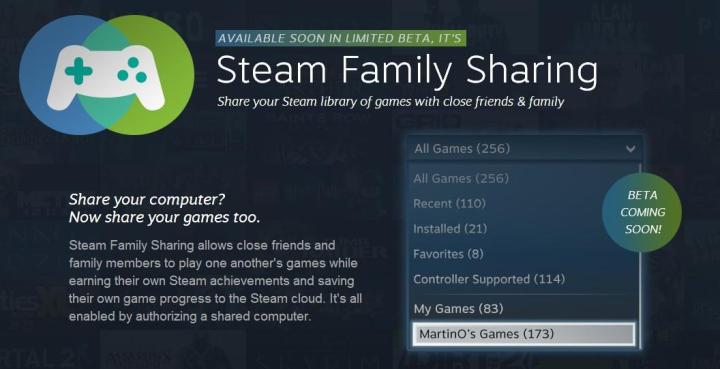
Valve has announced the “Steam Family Sharing” service, which grants Steam users the ability to share their libraries between friends and family. The new service enters into limited beta next week, and anyone with a Steam account can sign up now. Coincidentally, the news comes on Steam’s 10th anniversary.
For decades, the debate between console and PC gamers has raged, with PC gamers pointing to their better graphics, faster processors, the ability to play mods, and more. Console gamers have been aware of these advantages, but instead of submitting to the callings of the green-eyed monster, they could always rest easy in the knowledge that they have one glorious trump card to play: the ability to borrow games. Sure, the ability to see the individual nose hairs of a character in a game thanks to a graphics card so powerful gamers from the 80s might consider it witchcraft is nice, but the inability to go over to a buddy’s house and raid their games library is a con. Unless you are financially secure to the point you can buy any game ever. In which case, we we should totally hang out some time and be friends.
There are limits to the games you can share through the service, but they aren’t far removed from the same limitations console users face. Games with subscriptions, online passes, or their own log-ins separate from Steam, for example, can’t be transferred. But the majority of games will be, including DLC the lender purchased.
“Our customers have expressed a desire to share their digital games among friends and family members, just as current retail games, books, DVDs, and other physical media can be shared,” Anna Sweet of Valve said in the press release. “Family Sharing was created in direct response to these user requests.”
Once you sign up for Family Sharing, you can then register who you want to share your library with. That person will then be able to play a game from the original person’s library for as long as they like, or at least until the original owner plays that same game. When that happens, the borrower will have a few minutes to log out and must then wait until the original purchaser is done playing to borrow it again. They’ll also be given the option to purchase the game themselves instead of waiting. The original owner can authorize up to 10 additional devices, but the library can only be accessed by one user (excluding the owner) at a time.
Loaning out games isn’t exactly a revolutionary idea, but it is something gamers are passionately in favor of. Just look at the trail of digital torches and pitchforks that threatened Microsoft when rumors spread that a fee would be attached to used games on the Xbox One. Such a move would have meant that borrowed games would be a thing of the past on consoles (or at least a thing of the past on the Xbox One, a fact Sony played to its advantage masterfully at E3).
Just be careful who you loan games to. If they are caught cheating while playing a game you loaned them, your account may be revoked.


